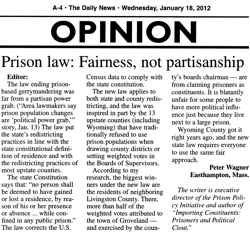Prison law about fairness, not partisanship
The Daily News recently published a letter to the editor by Peter Wagner explaining that the law ending prison-based gerrymandering in New York is about democratic fairness rather than petty partisanship.
by Leah Sakala, January 27, 2012

The Daily News recently published a letter to the editor by PPI’s Executive Director Peter Wagner that clarifies that the New York law is about fundamental democratic fairness, not petty partisanship. Upstate counties, it turns out, took the lead in rejecting prison-based gerrymandering because of the way it was distorting their districts.
As Peter explains:
Prison law about fairness, not partisanship
The law ending prison-based gerrymandering was far from a partisan power grab. (“Area lawmakers say prison population changes are ‘political power grab,’” story, Jan. 13) The law put the state’s redistricting practices in line with the state constitutional definition of residence and with the redistricting practices of most upstate counties.
The state Constitution says that: “no person shall be deemed to have gained or lost a residence, by reason of his or her presence or absence … while confined in any public prison.” The law corrects the U.S. Census data to comply with the state constitution.
The new law applies to both state and county redistricting, and the law was inspired in part by the 13 upstate counties (including Wyoming) that have traditionally refused to use prison populations when drawing county districts or setting weighted votes in the Boards of Supervisors.
According to my research, the biggest winners under the new law are the residents of neighboring Livingston County. There, more than half of the weighted votes attributed to the town of Groveland — and exercised by the county’s boards chairman — are from claiming prisoners as constituents. It is blatantly unfair for some people to have more political influence just because they live next to a large prison.
Wyoming County got it right years ago, and the new state law requires everyone to use the same fair approach.
Peter Wagner
Easthampton, Mass.The writer is executive director of the Prison Policy Initiative and author of “Importing Constituents: Prisoners and Political Clout.”



